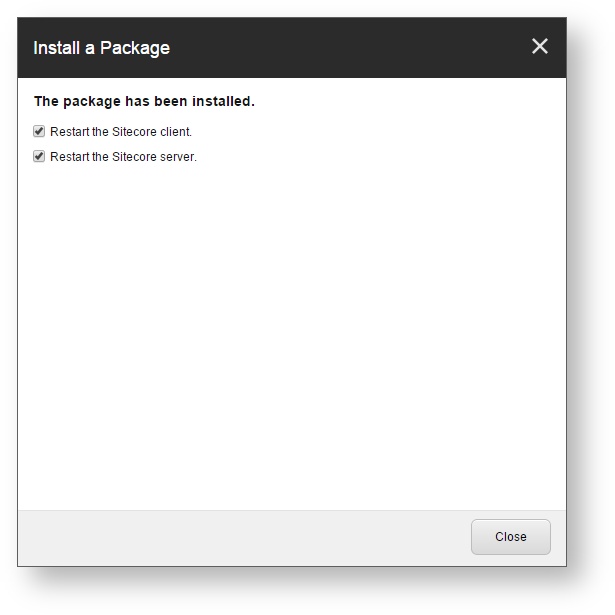November 22, 2019 (5.0.515.1)
November 22, 2019 (5.0.515.1)
|
|
Per the Coveo Version Support Lifecycle policy, this Coveo for Sitecore 5 release has been retired. See available Coveo for Sitecore releases. Even if this release is retired, you must still perform some of its upgrade steps to upgrade to a more recent version of Coveo for Sitecore. |
This release includes the 2.7219.11 version of the JavaScript Search Framework (see October 2019 Release (v2.7219)).
When using a CDN with the Coveo Hive framework, this release includes the latest 2.7219 version of the JavaScript Search Framework (see Choosing between local and CDN Coveo JavaScript resource files).
Release Notes
This section summarizes the new features and fixed support cases introduced in the Coveo for Sitecore November 22, 2019 release (5.0.515.1).
| Identifier | Enhancement |
|---|---|
| SC-4149 | Added support for Coveo JavaScript Search Framework version 2.7219. |
| Identifier | Case | Fixed support case |
|---|---|---|
| SC-4013 | 00053860 | Fixed the creation of an Example Search Page using the Insert Options feature. |
| SC-4103 | 00055766 | Added handling of malformed <!-- BEGIN NOINDEX --> - <!-- END NOINDEX --> HTML indexing exclusion tag sequence. |
| SC-4124 | 00056409 | Fixed issue with the DocumentsValidation rebuild step failing on custom-named databases. |
| SC-4126 | 00056260 | Fixed erroneous logging of warnings for conflicting Coveo dictionary entry keys. |
| SC-4146 | 00056719 | Fixed issue with the handling of Sitecore.Jobs objects in Sitecore 9.2. |
| SC-4153 | 00056369 | Fixed issue with the Coveo for Sitecore proxy forwarding the Proxy-Connection header. |
| Identifier | Bug fix |
|---|---|
| SC-4006 | Fixed improper reporting of invalid usage of Coveo strategies. |
| SC-4022 | Removed the 'Focus on searchbox after initialization' option as it has been removed from the JavaScript Search Framework. |
| SC-4076 | Fixed issue with special characters in queries locking up search pages in Sitecore 7 and 8 instances (see Ajax Error 500 When Using Special Characters in a Query). |
| SC-4095 | Fixed issue causing the clickableUri of media items to be indexed with a relative path. |
Upgrade Steps
|
|
Per the Coveo Version Support Lifecycle policy, this Coveo for Sitecore 5 release has been retired. See available Coveo for Sitecore releases. Even if this release is retired, you must still perform some of its upgrade steps to upgrade to a more recent version of Coveo for Sitecore. |
This section describes how to upgrade Coveo for Sitecore from August 8, 2019 (5.0.461.9) to November 22, 2019 (5.0.515.1). If you're upgrading over multiple versions, Coveo has a procedure to streamline the process.
|
|
For the best Coveo for Sitecore experience, always follow the Best Practices When Upgrading Coveo for Sitecore. |
Step 1: Upgrade Coveo for Sitecore
|
|
Make sure the Microsoft MVC security update MS14-059 is installed on every Sitecore host in your environment. |
-
Log in to the Sitecore Desktop.
-
Access the Installation Wizard (Sitecore Start Menu > Development Tools > Installation Wizard).
-
Upload and install the
Coveo for Sitecore XX 5.0.515.1package. -
When prompted to overwrite files, click Yes to all.
-
When prompted to overwrite items, select Overwrite, then click Apply to all.
NoteYou might be prompted twice with this question. Select the Overwrite option and click Apply to all both times.
-
Once the installation is completed, make sure that you restart both the Sitecore client and server.

Step 2: Manually Update the Coveo Configuration Files
The Coveo configuration files are located in the App_Config\Include\Coveo folder. When upgrading, you must compare the changes to the .example files from your current Coveo for Sitecore version with the ones in the build you're upgrading to. Then, you can merge these changes into your current configuration files. This method allows you to keep your own customization intact, while still benefiting from the latest enhancements brought in the product. You can use a merge tool such as WinMerge to accomplish this.
In further detail, here are the modifications that you must perform to the configuration files resulting from the feature changes between the previous and current Coveo for Sitecore releases:
Coveo.SearchProvider.Rest.config
Sitecore 7 and 8
The <preprocessRequest> element below has been added as a child of the <pipelines> element to ensure that requests targeting the REST endpoint can handle special characters.
<preprocessRequest>
<!-- This processor is required to ensure that requests targeting the REST endpoint can handle special characters. -->
<processor patch:instead="processor[@type = 'Sitecore.Pipelines.PreprocessRequest.SuppressFormValidation, Sitecore.Kernel']" type="Coveo.SearchProvider.Rest.Processors.PreprocessRequest.SuppressFormValidation, Coveo.SearchProvider.Rest" >
<urlPaths hint="list:AddUrlPath">
<urlPath>/coveo/rest/</urlPath>
<urlPath>/sitecore/admin/</urlPath>
<urlPath>/sitecore/shell/</urlPath>
<urlPath>/-/speak/request/</urlPath>
</urlPaths>
</processor>
</preprocessRequest>
Coveo.UI.Controls.Specific.config
Sitecore 8 and 9
The <pipelines> element below has been added as a child of the <sitecore> element.
<pipelines>
<group name="itemProvider" groupName="itemProvider">
<pipelines>
<addFromTemplate>
<processor type="Coveo.SearchProvider.Processors.UIResolveBranchRenderingDataSourcesProcessor, Coveo.SearchProvider" >
<TemplatesToExpand hint="list">
<coveoExampleSearchPage>{0555887D-AB12-46E6-8EA8-93D2E6ED3CB4}</coveoExampleSearchPage>
</TemplatesToExpand>
</processor>
</addFromTemplate>
</pipelines>
</group>
</pipelines>
This addition tells Sitecore to call the new UIResolveBranchRenderingDataSourcesProcessor processor so that the creation of a new Example Search Page using the Insert Options feature works correctly.
Step 3: Publish your site
In the Sitecore Content Editor, perform a publish site action. This ensures any changes related to Coveo components in the upgrade are published to the web database.